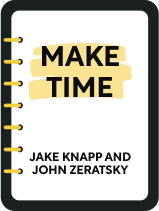

This article is an excerpt from the Shortform book guide to "Make Time" by Jake Knapp and John Zeratsky. Shortform has the world's best summaries and analyses of books you should be reading.
Like this article? Sign up for a free trial here .
Do you get easily distracted? Do you need to set healthy boundaries to get work done?
Sometimes it feels impossible to stay focused on tasks when people or emails are interrupting you. Thankfully, Jake Knapp and John Zeratsky’s book Make Time has tips for creating boundaries that will help you stay focused.
Keep reading to learn how to set healthy boundaries with people and yourself.
Protect Your Focus
Once you’ve established your Focus and learned what practical methods will help keep you “in the zone,” you’ll still need to fend off all the distractions that will try to tear your attention away. To do that, you’ll need to learn how to set healthy boundaries—not just for other people, but for all the technology you’ve come to rely on: your computer, your TV, your WiFi, and most of all your phone. Knapp and Zeratsky suggest dozens of strategies to limit the ways that colleagues and devices can distract you from your Focus.
Some techniques are simple and some are extreme, but all are based on the central premise that your time is more important than the latest shiny thing shouting for your attention.
1. Let People Know You Mean It
The modern working world is governed by calendars and lists of things to do, and for most of us, we’re not the only ones with the power to schedule our time. The first thing you must do is block off time for your Focus on your calendar. If your calendar can be viewed by others at your workplace, this will let them know that you’ve set aside time for your specific task or project. The authors stress that you should be firm with the time you’ve set aside for yourself, but also make sure that you use that time constructively. Be willing to reschedule or even cancel other activities. Not every meeting has to be a meeting, nor do they need to take as long as they do.
The hardest part may be learning to say no to other people’s requests for your time. But you need to set healthy boundaries with insistent people. The authors insist that you should always be honest about why you’re saying no, and they even suggest rehearsing a script for telling people no if you find it difficult.
2. Take Time Back From Technology
Today’s information industry has fine-tuned its tactics to keep you checking your apps, responding to notifications, and consuming new media to such a degree that it takes a concerted effort to resist its drag on your attention. From their careers in product development, Knapp and Zeratsky speak from firsthand experience about Big Tech’s tactics.
Websites, apps, and streaming services are in constant competition for eyeballs, clicks, and revenue. Unlike industries with a slower turnaround, tech developers can determine in real time how successful their strategies are. As a result, the cycle of competition has produced a system of addictive, intermittent rewards coupled with an utter lack of barriers to accessing news, games, memes, and clickbait.
The barrage of modern media is so overwhelming that it takes more than sheer strength of will to keep it at bay. The authors contend that you have to actively put barriers back in place to keep your devices from stealing your time.
3. Lock Down Your Phone
The single most pernicious device that impinges on your ability to concentrate is your smartphone. Phones have completely revolutionized society by bringing great advances to our ability to communicate and access information. However, the price we’ve paid as individuals is a massive drain on our time and attention.
The authors’ first recommendation is to delete all social media apps, games, and even your email from your phone. If that’s too extreme, they suggest you turn off all notifications and remove the apps from your homescreen, forcing you to choose when to use each app. Finally, you can leave your phone behind, especially while you’re working on your Focus. Leave your phone at home, in another room, or even in a locker if one’s available. In other words, turn your phone into a tool that serves you, and not the other way around.
4. Slow Down Your Email
Many people make clearing their inbox a priority every day. This can become so overwhelming that responding to email uses up most of your productive time. While many jobs require quick email responses, Knapp and Zeratsky point out that for most of us, always responding isn’t as important as you’d think. Your employer or business will benefit more if you spend your time doing meaningful work than if you squander it by reacting to random email queries. If your job is such that some communication is time-sensitive, you can set up an email autoresponse to let people know how to reach you by other means (such as your business phone).
The authors present several strategies to take control of your email time:
- Only respond to email at the end of the day, when your energy is lower. (Email doesn’t require as much mental work as other tasks.)
- Create an email schedule to check two or three times per day. (This can be especially useful if you need to communicate with people in certain time zones around the world.)
- Budget your email time, using apps to lock you out if you have to.
These practices will probably stop you from cleaning out your inbox every day. In that case, Knapp and Zeratsky advise that you set “once a week” as a more realistic goal for an empty inbox. Whichever method you choose, let your colleagues (and friends and family) know that you’re going to address email slowly, and not to expect a rapid response.
5. Turn Off Your TV
This recommendation from the authors may be particularly hard to hear, because relaxing at the end of the day is so important, and we’re currently living in a Golden Age of quality TV content. However, most of us don’t realize how much time we give up to the TV. The authors suggest setting healthy boundaries with television by making it an occasional indulgence, not an everyday activity.
(Shortform note: A study by the US Bureau of Labor Statistics shows that during the Covid lockdown of 2020, Americans spent an average of three hours per day watching TV on a variety of devices. However, the study notes that TV use varies with age—people over 75 watch more than five hours per day while people aged 35-44 watch only two hours per day.)
Also, you can save money on your TV by being intentional about what you watch. If you cancel continuous streaming subscriptions, you can still rent individual movies or shows from platforms such as Amazon and YouTube, or borrow DVDs for free from your local library. Most streaming platforms make it possible to subscribe long enough to binge a series and cancel when you’re done.
6. Use Technology Purposefully
In summary, the key to taking your life back from technology is to be proactive about how you use it and set healthy boundaries with it, instead of reacting to its every demand. In particular, Knapp and Zeratsky advise that you determine which single app or device drains the most of your time and find a way to change how you use it.
In particular, Knapp and Zeratsky recommend you disconnect from the 24-hour news cycle. Instead, they suggest you set aside time to read the news once per week. Modern news is modeled around sparking fear and anger in consumers to drive your attention toward ads. Any events of major importance will still be in the news when you get around to it, and hopefully with more nuanced analysis than spur-of-the-moment “breaking news” allows. If something major happens in the world that you need to know about, the authors insist that it will reach you through other means than your devices, such as hearing about it from people at work.
In contrast to Newport’s advice to check the news in the morning, Knapp and Zeratsky suggest removing the Internet entirely from your morning routine, arguing that the moment you first log into your email, check the news, or look at social media, your struggle to fight against distraction begins. The longer you can delay that from starting, the longer you’ll feel clear-headed and focused. If you need extra help avoiding the internet, you can even consider putting your home’s router on a vacation timer, so that the Internet is only available for certain hours of the day.

———End of Preview———
Like what you just read? Read the rest of the world's best book summary and analysis of Jake Knapp and John Zeratsky's "Make Time" at Shortform .
Here's what you'll find in our full Make Time summary :
- How the current landscape is designed to steal your time and attention
- How to be proactive to take back your time
- Why we were all better off as hunter-gatherers






